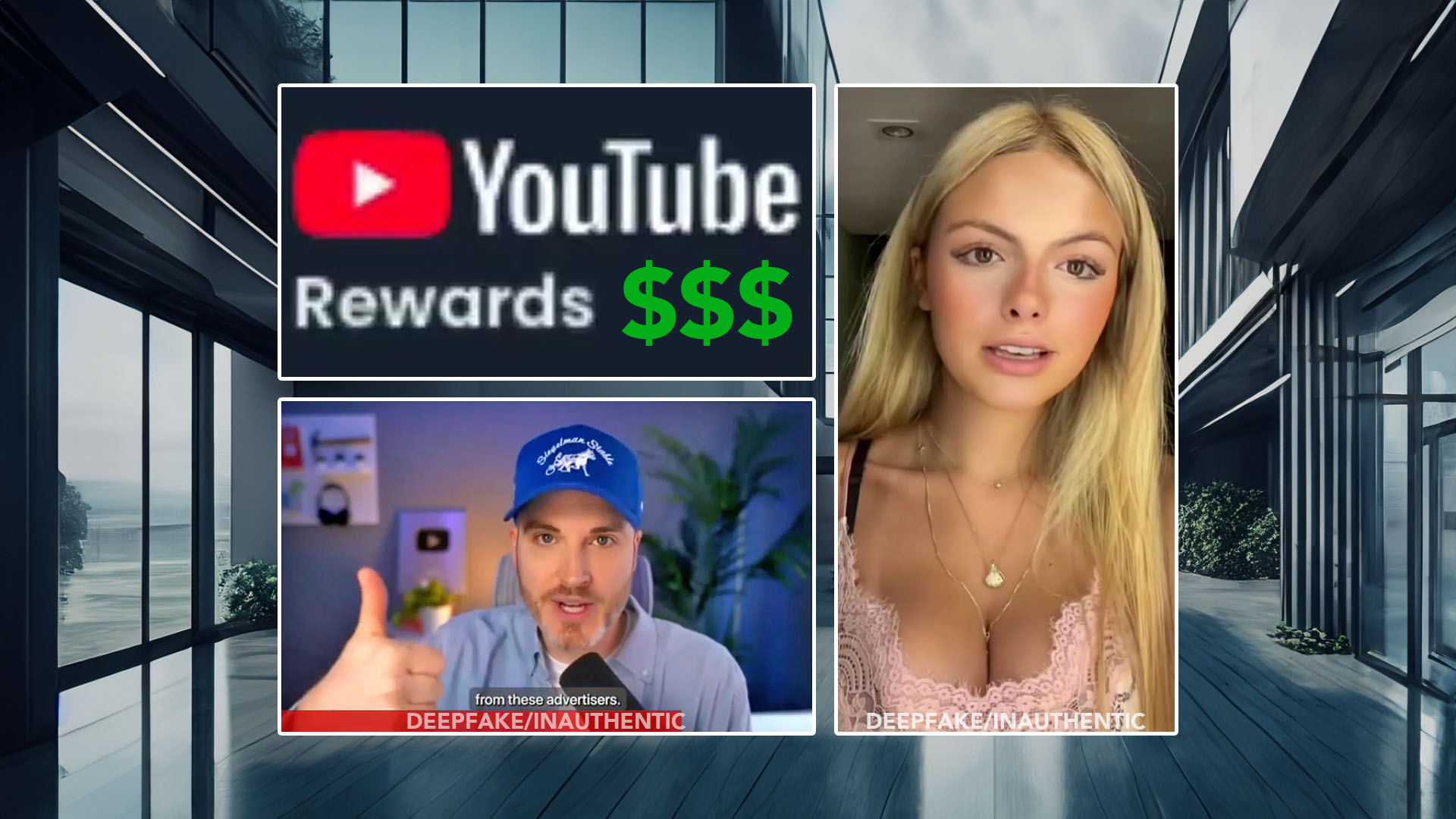Scammers claim a special YouTube Rewards program offers substantial daily earnings for simply watching and reviewing videos. They say watching videos earns easy money. But the truth is, the YouTube Rewards program is not a real or legitimate product created by Google or YouTube. This article unmasks the “YouTube Rewards app” scam that preys on unsuspecting users through social media ads, revealing how it operates and why you should steer clear.
This YouTube video serves as a full guide to the YouTube Rewards program scam, for anyone who wishes to watch rather than read:
The Allure of Easy Money: How the Scam Spreads
The “YouTube Rewards program” scam frequently originates from alluring advertisements on platforms like Facebook and Instagram. These ads often feature manipulated videos, including deepfakes or misused footage of influencers, to create a false sense of legitimacy. The scammers falsely claim that by joining this exclusive YouTube Rewards program, you can earn significant amounts—from $100 to $300 a day—just by providing feedback on videos. This promise of easy money for watching videos is a powerful lure, especially for those searching for ways to earn online.
Understanding the Deception
Upon clicking these deceptive ads, users typically land on a website designed to mimic an official YouTube or Google page. The site often displays a fake “congratulations” message, suggesting you have been “selected” for the YouTube Rewards program and have already earned a starting balance, perhaps $33.91.
The scam then prompts users to “evaluate” a few videos, usually by clicking a simple “yes” or “no” button. For each click, the displayed balance inflates, creating an illusion of rapid earnings. For example, a user might see their balance jump by $45 for each “evaluation,” quickly accumulating to hundreds of dollars. This tactic makes the prospect of the YouTube Rewards app seem incredibly profitable.
However, the money displayed is entirely fictitious. The scammers’ ultimate goal is not to pay you but to extract your personal and financial information.
Red Flags and Warning Signs
An investigation into the “YouTube Rewards program” reveals multiple red flags:
- Urgency Tactics: The scam often employs high-pressure sales tactics, claiming the offer is available for only a limited time—sometimes as short as five minutes. This creates a false sense of urgency, pressurizing individuals to make hasty decisions without proper research.
- Misused Imagery and Deepfakes: The use of deepfake technology or the unauthorized use of real individuals’ likenesses is a common characteristic. Scammers superimpose fake audio onto genuine videos, making it appear as though reputable personalities endorse the “YouTube Rewards app” or program.
- Suspicious Origins: Many of these scams trace back to foreign countries, with Brazil being a notable origin point for many online frauds. Websites often use country-specific domain extensions like “.com.br,” which can be a subtle indicator of their deceptive nature.
- Requests for Payment: Ultimately, the “YouTube Rewards program” requires an “access fee” or similar payment. This fee is typically framed as a small, one-time charge to unlock your supposed earnings or gain access to the “tool.” The payment page often appears on unfamiliar third-party sites, like Hotmart.com, which has been associated with other online scams. The spelling of words such as “access” is sometimes incorrect.
- Lack of Authentic Reviews and Complaints: While people search for reviews of the “YouTube Rewards program” or “YouTube Rewards app,” credible, positive reviews are absent. Instead, individuals may find scam warnings and complaints on platforms like Trustpilot or the Better Business Bureau (BBB) website, though specific, detailed reviews directly from users of this particular scam are limited because the “product” itself is designed to vanish quickly after extracting money. Consumer Reports has not evaluated this specific product, as it is not a legitimate offering.
Why “YouTube Rewards” Is a Scam
There is no legitimate YouTube Rewards program that pays individuals significant amounts of money for simply watching and reviewing videos. Google and YouTube have official programs for content creators and advertisers, but none involve direct payments to users for basic video consumption. The concept of earning $45 for a single “like” or “dislike” on a video is fundamentally unrealistic and designed to exploit those seeking easy income.
Protecting Yourself From the YouTube Rewards Program Scam
To avoid falling victim to the “YouTube Rewards app” scam and similar online schemes:
- Be Skeptical of “Too Good to Be True” Offers: If an online earning opportunity promises substantial income with minimal effort, it is almost always a scam.
- Verify Legitimacy: Before engaging with any online program claiming affiliation with major companies like YouTube or Google, visit the official company website directly to confirm the program’s existence.
- Research Reviews and Complaints: Conduct thorough searches for reviews of the program, specifically looking for terms like “YouTube Rewards program complaints” or “YouTube Rewards app Trustpilot.” Pay attention to warnings from organizations like the BBB.
- Never Pay for Access to “Free” Earnings: Legitimate earning opportunities do not require an upfront payment to access your supposed profits.
- Protect Personal Information: Be extremely cautious about providing personal or financial details, such as credit card numbers or PayPal information, to unverified websites.
The “YouTube Rewards program” is a clear example of an online scheme designed to take advantage of individuals hoping to earn money by watching videos — much like the recently reported-on My Mobile Machine scam. By understanding its deceptive tactics and exercising caution, you can protect yourself from becoming a victim.
Editor’s Note: I utilized Google Gemini to help write this article. However, Google Gemini used the transcript from a well-researched YouTube video I created about this subject, meaning hard work went into the creation of this scam-busting effort. Scammers use AI to scam people. It’s time we use AI to bust their scams.

Thanks!
How can I get a refund?? I was one of the ones scammed!! Smh